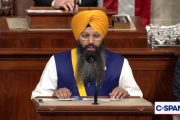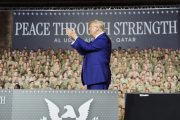
After roughly six months of investigation into Facebook’s role in the 2020 election, a special counsel appointed by Wisconsin Assembly Speaker Robin Vos last August submitted a report Tuesday. That report finds that Facebook head honcho Mark Zuckerberg’s grant funds violated Wisconsin’s bribery laws. And while the report found a plethora of areas of concern, it pulls up short of questioning the outcome of the election.
During the 2020 election, Zuckerberg funneled nearly $9 million in grant funds “solely to five Democratic strongholds in Wisconsin,” reports the Federalist. Last August, the Office of Special Counsel was created to investigate concerns about election integrity and the 2020 election. Retired state Supreme Court justice Michael Gableman was appointed as special counsel to head the investigation. An interim report was delivered to the state assembly on November 10, 2021. Tuesday’s report was the follow-up to that report and noted that this report “is final in the sense that it provides a list of recommendations with time for the Legislature to act before the close of its session in March.”
And while the report addresses “the numerous questionable and unlawful actions of various actors in the 2020 election,” it dances around the elephant in the living room, with Gableman stating early on that the report does not call for another look at the re-count that occurred in late 2020 or to challenge the contentious certification of the 2020 presidential election. And to drive that point home, the report ends by saying that even if Wisconsin were to “decertify the certified electors in the 2020 presidential election” — which the report explains as an arduous process — “this action would not, on its own, have any other legal consequence under state or federal law,” adding, “It would not, for example, change who the current President is.”
But if the 2020 election were found to be rife with fraud or tampering, then either the certification deserves another look or “election integrity” is a meaningless word combo. And according to Gableman’s report, Zuckerberg broke the law and played a $9 million role in election fraud and tampering.
As the Federalist reports,
The first unlawful action, according to the report, concerned the payment of grant funds to five Wisconsin counties that were used to facilitate voting. That arrangement, Gableman wrote, violated Wis. Stat. § 12.11, which prohibits election bribery by providing it is illegal to offer anything of value to or for any person in order to induce any elector to go to the polls or vote.
According to the report, Priscilla Chan and Mark Zuckerberg providing financing that allowed the Center for Tech and Civic Life to offer nearly $9 million in “Zuck Bucks” to Milwaukee, Madison, Racine, Kenosha and Green Bay counties. In exchange, the “Zuckerberg 5,” as the report called the counties, in effect, operated Democratic get-out-the-vote efforts. Those grant funds then paid for illegal drop boxes to be placed in Democratic voting strongholds.
The illegal use of drop boxes represented a second area of concern to the special counsel’s office. The report notes state election code limits the manner in which ballots may be cast, providing that an elector must personally mail or deliver his or her ballot to the municipal clerk, except where the law authorizes an agent to act on the behalf of the voter.
Furthermore,
The Zuckerberg 5 also violated the federal and state constitutional guarantee of equal protection, according to the special counsel report. The grant money targeted specific voters for special voting privileges, to the disadvantage of similarly situated voters located in other Wisconsin counties. The report also detailed troubling evidence the Zuckerberg 5 counties allowing private groups working with the granting organization, the Center for Tech and Civic Life, to “unlawfully administer aspects of the election,” including in one county where one organization was unlawfully embedded in local government election administration.
So, with $9 million in “Zuck Bucks,” Zuckerberg led a criminal operation that violated laws and constitutional principles for the purpose of tampering with the 2020 election by paying to make sure Democrats got out to vote and exerting influence on the counting process. That may be the very opposite of “election integrity.”
But Zuckerberg was just getting started Zucking the 2020 election. Gableman’s report also shows that the Wisconsin Election Commission (WEC) illegaly directed clerks to ignore the section of the state election code regarding voting in nursing homes. In some nursing homes in Wisconsin, 100 percent of registered voters cast a ballot in the 2020 election. Not only is that an unheard-of rate of voter “turnout,” but as the report finds, those ballots included many ineligible voters. And nursing homes were not the only places where ineligible voters cast ballots.
In Wisconsin, some non-citizens are able to get driver’s licenses so they wind up on the voter master roll. State law requires that they are removed from the master roll, but the special counsel report found they were not removed. Similarly, individuals declared incompetent were left on the roll, though the law requires their removal.
Gableman’s report also addressed efforts on the part of government officials to obstruct the investigation, saying that both the Wisconsin Election Commission and the state attorney general “have refused to cooperate with the Legislature’s investigation and actively obstructed it.”
When seen together, these pieces clearly add up to election fraud and tampering, especially when one considers the involvement of government officials. That is further compounded when one looks at similar episodes of fraud and tampering all over the country during the 2020 election. When taken together, it appears to be evidence of massive election fraud and tampering that would — if properly investigated and rolled back — almost certainly bring the results of the election into question.
But if each incident of election fraud or tampering is viewed as “just another isolated incident,” then the finding of the report that this “would not, for example, change who the current President is” begins to make sense. By refusing to connect the dots, Gableman and his report have all the appearance of addressing concerns about election integrity with none of the messy danger of actually doing it.
With the 2022 mid-terms right around the corner and both the House and the Senate hanging in the balance, real election integrity has never mattered more. Meanwhile, Gableman and his report — while finding that Zuckerberg broke the law — accomplish little more than window dressing and lip service.




